






Cornell student and son of a Texas state senator was arrested last month for threatening to release revenge porn of his ex-girlfriend, a charge aided in part by a law his father voted for in 2015.
Industrial and Labor Relations senior Matthew Schwertner ’24 has been charged with harassment and threatening to publish intimate visual material over text messages he sent between Jan. 11 and Jan. 14 near Austin.
Schwertner allegedly sent his ex-girlfriend, who he last communicated with in July 2023, multiple intimate photographs of her and threatened to send the images to her mother and sisters unless she returned items he bought for her during their relationship, according to court documents.
When asked why he still had the photographs, Schwertner responded, “In case you acted like a 2 year old.” After repeated text messages from the victim asking Schwertner to cease communication with her, he wrote, “Its okay ur a poor mexican (sic) what can one expect,” in addition to several messages that referred to her with profanity.
A University spokesperson told The Sun that Schwertner is not currently enrolled at Cornell but did not disclose whether he is not enrolled as a result of his arrest. His information still appears
on the Cornell directory as a student as of publication.
Schwertner’s father, Charles Schwertner, has been a Republican state senator representing District 5 in Texas since 2013. In 2015, he voted in favor of a bill to make revenge porn a serious offense, known as Senate Bill 1135. The senator’s office did not respond to a request for comment.
In 2018, Sen. Schwertner similarly faced an allegation of sexual harassment when a graduate student at the University of Texas at Austin accused the senator of sending her unwanted lewd text messages. He denied the allegation and an investigator determined evidence “did not support a finding” that he violated Title IX.
Schwertner was arrested on Jan. 16 and released on a bond of $15,000 for his felony charge of threatening to publish intimate photographs and posted a bond of $2,500 for a class B misdemeanor of harassment, as he allegedly sent repeated electronic messages in a manner likely to alarm, torment and embarrass the victim, according to court documents. Schwertner’s attorney did not answer a request for comment.
Schwertner will appear in court on March 8 for his pretrial conference.
While many students celebrated Valentine’s Day on Feb. 14, the date also marked the start of Lent for Catholics, the 40-day religious observance during which they abstain from consuming meat other than fish on Ash Wednesday and every Friday until Easter. However, many campus Catholics wish that Cornell would provide greater dining options during Lent.
Cornell Dining serves food options
that accommodate students’ diverse dietary needs, including vegan options and specific dishes for students following Kosher and Halal diets. In total, there are 10 dining halls spread between North, West and Central Campus, each serving salads and vegan food options.
“Our vegetarian and vegan menu items are an easy and delicious way to abstain from consuming meat,” Cornell Dining Director Paul Muscente wrote in an email to The Sun. “And all of our eateries have vegetarian and vegan choices at every
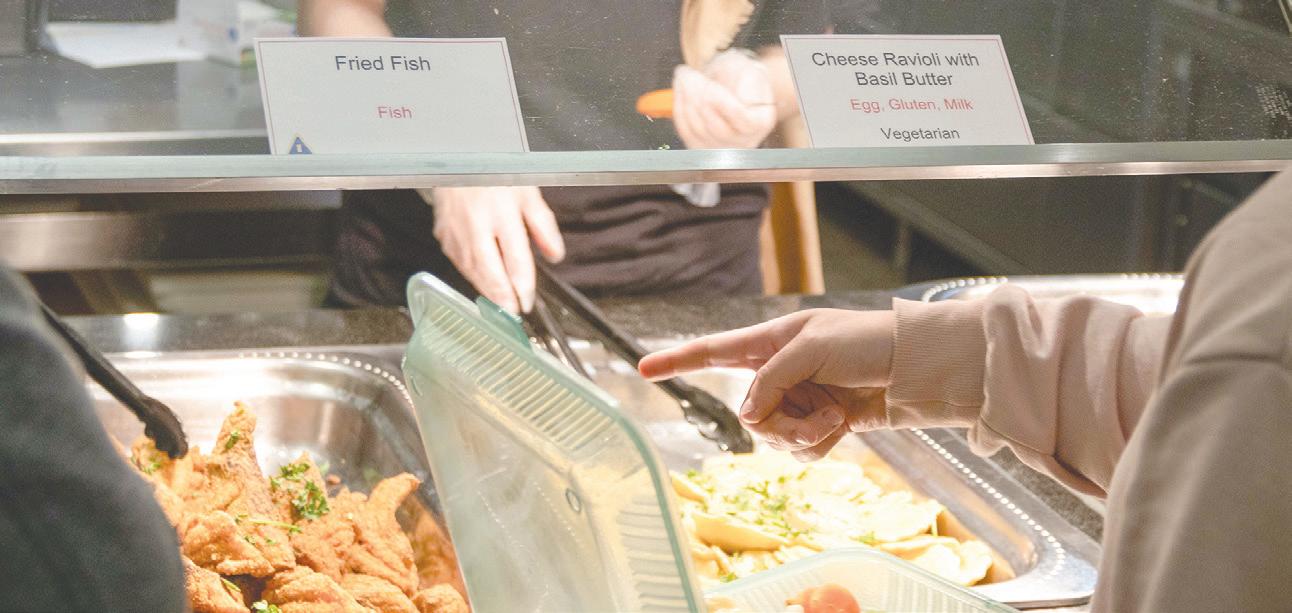
meal.”
Muscente noted that many campus dining halls serve fish in addition to vegetarian options.
“Many observant Catholics also look for fish as an alternative during Lent, especially on Fridays, and a quick check of our menus for Friday on Cornell Dining Now shows quite a few fish entrées listed for lunch and dinner all over campus,” Muscente stated. “And many of our salad bars have tuna, tofu, hard-cooked eggs and other non-meat protein options.”
Carla Flores ’25, a member of the student leadership team for Cornell Catholic Community, said that Cornell Dining can better support Catholic students by preparing specific Lenten meals in addition to their traditional vegan options.
“I know a lot of them already have vegan or vegetarian options, but it would be nice [to have a specific meal] — not as a reminder, but to say, ‘we understand why you’re abstaining from meat today,’” Flores said. “It'd be a nice way to … recognize … that this is what a lot of our students are going through.”
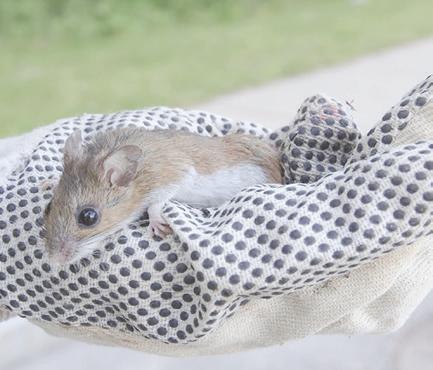

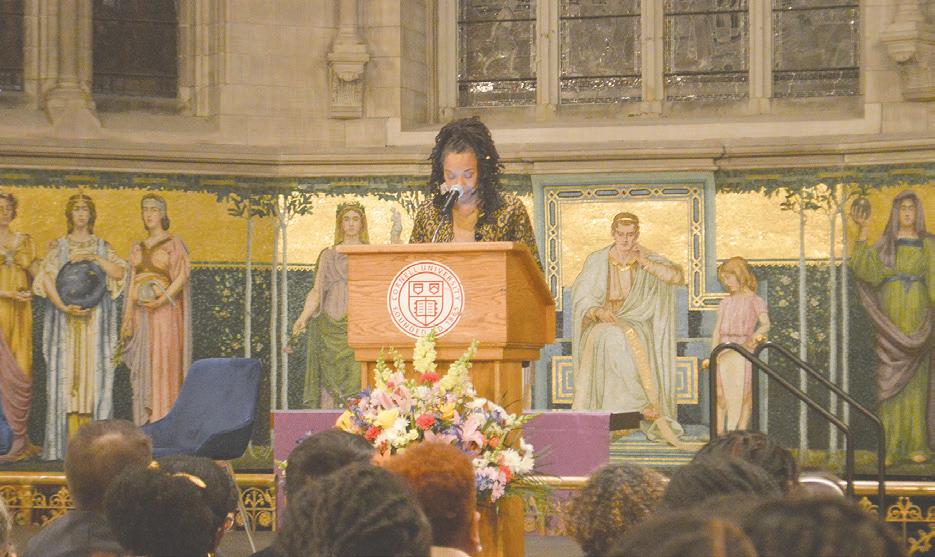
Legal scholar, civil rights activist and Cornell alumna Kimberlé Crenshaw ’81 delivered the 2024 Martin Luther King Jr. Commemorative Lecture on Feb. 19, speaking to around 400 attendees in Sage Chapel about democracy and freedom of expression.
Crenshaw, who is also a professor of law at Columbia University and the University of California, Los Angeles, is widely known for coining the terms “intersectionality” and “critical race theory.”
In the lecture, entitled “The Urgency for Intersectional Justice,” Crenshaw specifically drew parallels between racial injustices that MLK combatted and the current efforts of lawmakers and parents’ rights groups to prevent the teaching of Crenshaw’s research. The lecture was also in celebration of the 50th anniversary of the Gender Equity Resource Center, formerly the Cornell’s Women’s Resource Center.
Crenshaw connected the lecture to Cornell’s Freedom of Expression theme for the 2023-2024 academic year, quoting Justice Benjamin Cardozo — just as Cornell President Martha Pollack did in her Aug. 24 welcome message — regarding the importance of free expression.
“Free expression is important because it ‘is the matrix, the indispensable condition of nearly every other form of freedom,’” Crenshaw said. “Allow me to say ‘amen’ to that.”
In a more somber tone, Crenshaw went on to lament the current state of freedom of expression on and off campus. Many members of the audience murmured
and nodded along with Crenshaw’s words.
“As symbolically meaningful as this invitation is to me, I find myself distraught, disappointed and disillusioned,” Crenshaw said. “The mounting challenges we face in protecting Cornell’s legacy and the many failures to transform these rituals and gestures into vigorous defense of free thinking about anti-racism, about social justice and academic freedom, I feel at times are almost too much to bear.”
Freedom of expression at Cornell has been tested during the year of its celebration, especially in the wake of protests in response to the ongoing Israel-Hamas war. Students, faculty and alumni have expressed concern over the University’s interim expressive activity policy, questioning its implications for freedom of assembly and noting selective enforcement of the rules.
Crenshaw also shared a personal anecdote about finding her voice in the face of loss as a third-grade girl coping with the death of MLK. This anecdote was one of three excerpts she read from her memoir she is currently writing, entitled “Notes From a Backtalker.”
“‘By this time, my insides were spewing molten lava. It was simply unbearable that [MLK] could be taken like this so suddenly, so permanently. But how could we allow ourselves to sit in silence in the face of it?’” Crenshaw read. “‘I heard words coming out of my mouth that were not mine. Words extorting everyone not to let [MLK’s] death be the end of our freedom struggle.’”


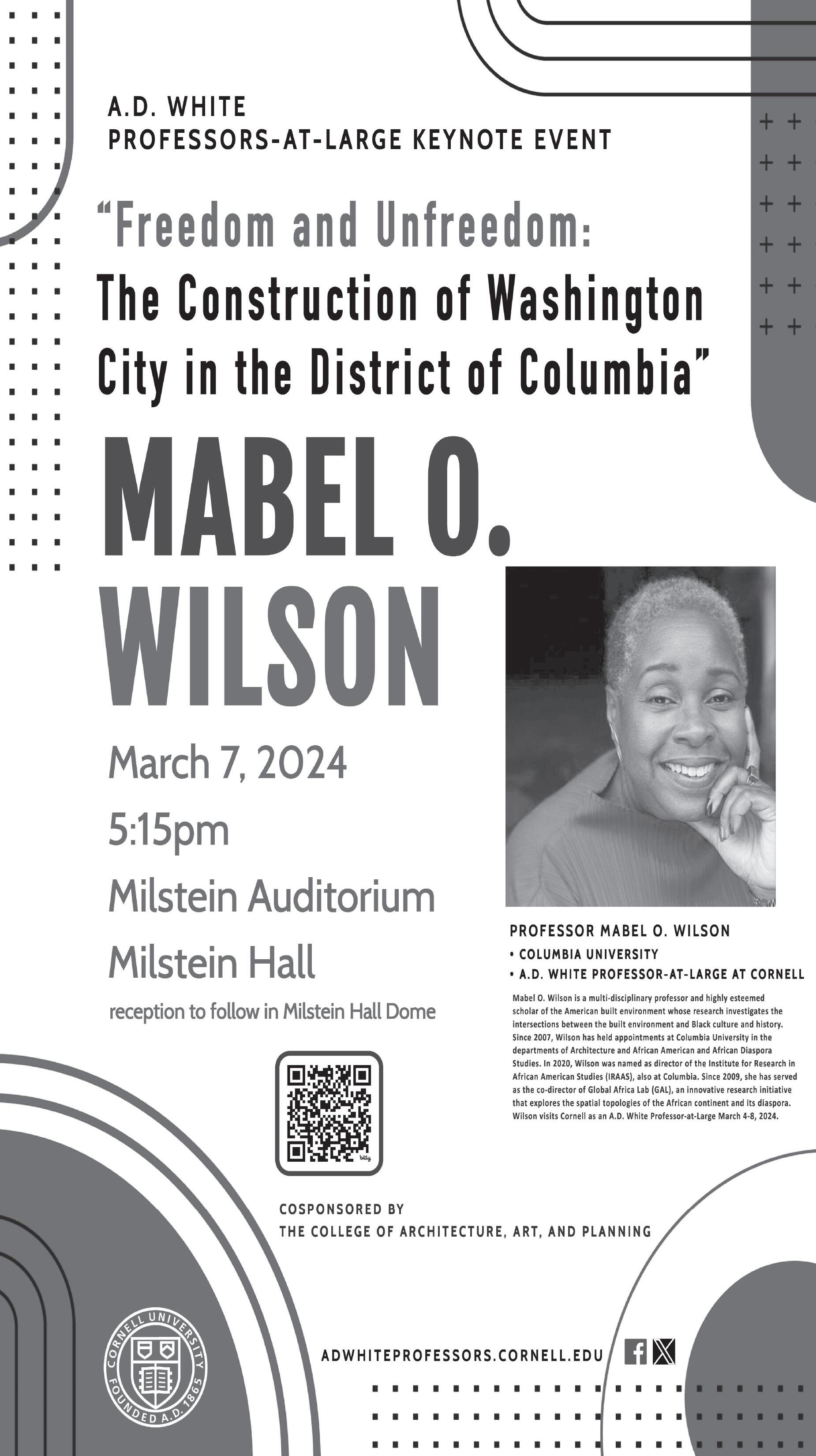

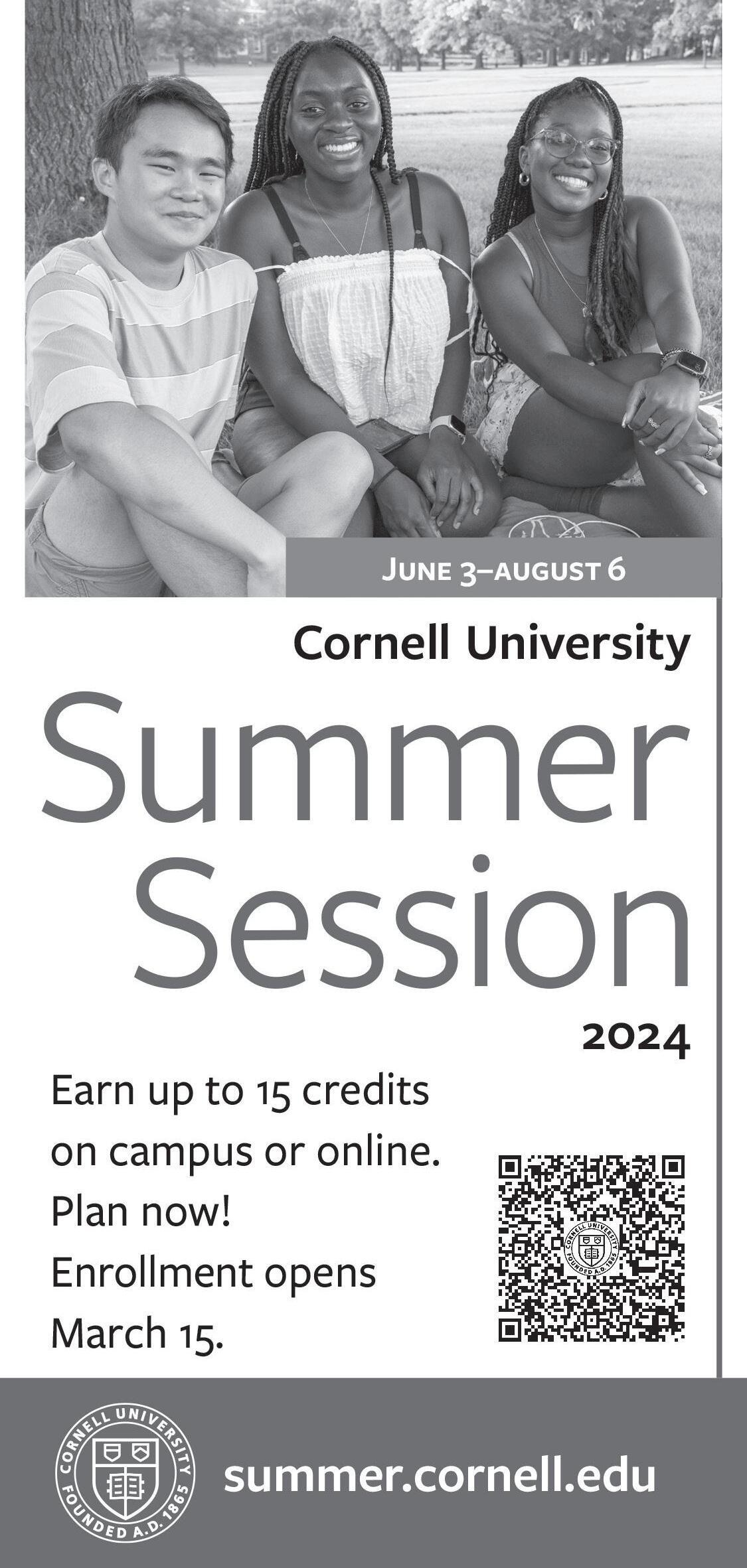
When Victoria Stephens ’24 transferred into Cornell’s Kappa Kappa Gamma chapter after rushing the same sorority at Binghamton, she initially felt like she did not fit in. While her feelings of exclusion were not directly related to race, she noticed that many of the sorority sisters bonded over experiences typically more accessible to white individuals.
“Nobody said, ‘You’re not a part of Kappa because you’re Peruvian.’ Nobody said that to me and I don’t think that thought came across anyone’s mind,” Stephens said. “But it was more [about how] I didn’t go to private school. I went to public school. I didn’t go to a boarding school, and I didn’t go to camp. Kappa is predominantly Jewish. I’m not Jewish. A lot of the common ground the other girls would talk about, I was not able to relate to.”
While women of color who belong to sororities under the Panhellenic Association reported a diverse array of experiences across several organizations, many faced bias, underrepresentation and exclusion, despite sororities’ growing diversity, equity and inclusion initiatives.
The Sun interviewed four women of color to discuss the effect their racial background has had on their experiences with Panhel sorority life, from recruitment to membership.
Fears of Tokenism, Ostracization Puncture Recruitment Process for Women of Color
Anaisa Cespedes ’24 decided not to go through recruitment as a freshman due to her anxiety that being a woman of color would alienate her from her sorority.
“I was scared in general — scared of just being ostracized within my organization if I did make it through rounds and [get] picked. I was scared of being the token person of color because while Cornell is diverse, people usually hang out in clusters, and some of that is defined by background and skin color,” Cespedes said. “So I was nervous that girls in my own member class would ignore me and think that [the chapter] had to pick someone who was brown.”
It was only after she began hearing positive opinions from other friends of color about their Panhel sororities that Cespedes decided to go through informal recruitment in the fall of her sophomore year. But she still feared that her interactions with members of the chapter would be impacted by cultural differences or implicit biases.
Amoure Bell ’25, a member of Alpha Chi Omega, said that the largest anxiety that girls of color have going into recruitment is fear of being tokenized or pigeonholed according to their race by the sorority members.
“As a person of color, when you’re rushing, you may be worried about how you’re being perceived not only by personality but also by race,” Bell said. “[There’s] also the concern [of] if you’re a token pick or something.”
Stephens, who also served as Kappa Kappa Gamma’s 2022-2023 president, noticed that shared experiences and upbringings can play a role in getting a bid to a sorority. While not a direct reflection of race, pre-existing personal connections can inadvertently often exclude people of color.
“I haven’t met anyone that was like, ‘We can’t take this girl because she’s Black.’ No one is going to say that, but I’ve noticed getting into a sorority is a lot about people you know or the people that know you,” Stephens said.
Sometimes connections spread among familial lines, perpetuating homogeneity among each member class.
“For instance, if I know that this girl’s cousin is a freshman, the chances of her getting into Kappa [Kappa Gamma] are probably a lot higher than the average girl,” Stephens said. “But Kappa [Kappa Gamma] is mostly white and so it’s not necessarily a disadvantage because of their race, but more so a disadvantage because of their pre-Cornell experience.”
Jada Boggs ’25, the vice president of diversity, equity and inclusion of Alpha Chi Omega said that when she rushed, many sororities did not seem to have solid DEI initiatives in place.
“When I rushed, I found that a lot of sororities did not have a solid answer about their DEI work or commitment to DEI,” Boggs said. “I’m sure all the sororities value DEI, but, in my opinion, when a general member cannot tell me about DEI initiatives,
there is not a lot of active work going on.”
Cespedes, who served as Pi Beta Phi’s vice president of diversity and inclusion for the 2022-2023 term, said that the movement to institute DEI positions and efforts within chapters has only started within the last few years. She also said that some sororities take DEI more seriously than others.
“I’ve heard things in my position [as DEI chair] that other sororities don’t take DEI seriously. Right before recruitment, we have workshops to talk about our own experiences and not just throw definitions at you. But some sororities don’t even do that,” Cespedes said. “The most [some chapters] do is a [Panhel] meeting with other DEI chairs and recruitment chairs where they’re talking about DEI in general, when I think you could say a lot more than that.”
Stephens said that prior to rush, DEI chairs at Kappa Kappa Gamma educate members on how to foster inclusivity and equitability within conversations with potential new members.
“We talk a lot about the impact of our words versus the intention, emphasizing saying, ‘How was your break?’ or ‘Where do you call home?’” Stephens said, “versus ‘Where did you go for break?’ or ‘Where are you from?’”
Stephens noted that Kappa Kappa Gamma’s DEI chairs are usually white, amid a lack of interest in the position by the few members of color.
“I think that’s just because we’re a majority white sorority and appointing the one or two girls of color for elections would be wrong in itself,” Stephens said. “What has tended to happen is that the one or very few women of color don’t want to be in a position at all or would rather be in a different position. It would be completely unfair to automatically assign them to the DEI position just because of their race or background.”
Boggs suggested that sororities make their DEI training more comprehensive to improve the recruitment experience for women of color.
“I led [a workshop] for Alpha Chi Omega where we talked about the obvious — don’t be racist, homophobic, etc., and don’t say slurs,” Boggs said. “But [we] also talked about the history of Panhel sororities and how girls of color might not initially feel welcome and that we should keep that in mind. We also talked about simple things like placing emphasis on learning how to say everyone’s name and other things that make people of color feel appreciated and understood.”
Boggs described a positive reception from sisters to her nuanced, historicized DEI resource.
“After our training, multiple sisters reached out to me about learning things for the first time and how meaningful it was,” Boggs said.
Despite DEI efforts, the systemic whiteness that defines the history of many Panhel sororities makes the success of DEI efforts difficult.
Some of the sorority members interviewed by The Sun agreed that the experience of being a woman of color in a predominantly white sorority differs across chapters.
“I think some sororities are known for having more women of color than others. I know that Kappa [Kappa Gamma] is notoriously known for not having a lot of women of color. So my experience is going to be a lot different [than members of more diverse chapters],” Stephens said.
During her time as a member, Stephens said she has encountered multiple incidents of people not believing that she is in Kappa Kappa Gamma during and upon entry to mixers.
“When you’re a woman of color in a predominantly white sorority, sometimes people don’t believe that you’re actually in that sorority because you typically don’t look like other members,” Stephens said. “So sometimes, when you go to mixers or when you tell people you’re in the sorority, you’re more likely to be questioned, because they believe you’re lying.”
Stephens explained that the lack of diversity persists because recruitment naturally attracts girls who are similar to existing members.
To continue reading this article, please visit www. cornellsun.com.
At noon on Feb. 23, Cornell Public Safety informed students of an “anonymous” and “unsubstantiated” email threat to campus. Associate Vice President for Public Safety David Honan described these threats as including “hateful, incendiary language” and “threat[ening] violence” against Cornell and other universities. Honan stated that these threats were especially hurtful toward “Jewish, Israeli, Palestinian, Arab and Muslim students, faculty and staff.”
Members of the Dartmouth community received a similar message regarding “an anonymous email threatening violence that used hateful rhetoric based on religion and national origin” that had been investigated by the Hanover Police Department. According to Keiselim Alfredo Montás, director of safety and security at Dartmouth, several universities received an identical message.
Hanover Police Department Captain Jim Martin told The Sun that Dartmouth College safety and security informed the department at around 10:40 a.m. of a threatening email to several Dartmouth email addresses.
“It was a threat of an active shooter, and it was very vague, and it was very similar to some past almost template-like emails that have been going around during the past year.”
Christina MacCorkle can be reached at cmaccorkle@ ccornellsun.com
Izzie Diallo can be reached at iad34@cornell.edu
“It was a threat of an active shooter, and it was very vague, and it was very similar to some past almost template-like emails that have been going around during the past year,” Martin said.
Martin did not confirm that this email contained the same threat that Cornell received. However, Honan stated that the email Cornell received was “identical” to one received by “a number of other universities.”
Martin said that the message was considered a hoax because of its lack of specificity and having been sent to numerous other universities.
“It was determined through the office in a preliminary investigation in coordination with other law enforcement agencies that a similar message with a similar narrative was transmitted to other schools at approximately the same time,” Martin said. “It was nonspecific as far as the location and time that something would happen.”
University of Pennsylvania police were also notified of a violent email threat “that used hateful rhetoric based on religion and political affiliation,” according to an email sent to the UPenn community from the Penn Division of Public Safety.
Cornell University Media Relations declined to comment on the specific contents of the threats or any further planned response from the University. Cornell Police are investigating the origins of the email threat, according to Honan. Cornell University Media Relations declined to comment on the status of this investigation.
This email threat comes nearly four months after Patrick Dai ’24 was charged in connection with violent antisemitic threats that were posted on Greekrank, an anonymous online forum. Dai currently awaits trial in Broome County Jail after a federal judge denied his detention appeal in December.
Members of the Cornell community may report threats to personal or community safety to CUPD by calling 607-255-1111 or 911 for emergency assistance. Instances of non-emergency bias can be reported through the bias incident form.
Jim Martin Kate Sanders can be reached atksanders@cornellsun.com


Cornell Catholic Community President Colin Murphy ’25 acknowledged that Cornell dining offers food options that conform to Lenten restrictions, but suggested that they prepare traditional Lenten dishes as well.
“Most dining halls do have vegetarian and vegan options for most meals, so it’s not necessarily that Catholic students don’t have options, but there are lots of traditions around Lent,” Murphy said. “There are lots of regionally specific options people have served at various times for Lenten meals on Friday, and if the dining system recognized that and maybe made some of those available, I’m sure people would go.”
Kevin Salazar ’24, former president of the Cornell Catholic Community, suggested holding Friday fish frys — which are popular during Lent across the US, including in the Finger Lakes region — as an enjoyable opportunity for Catholic students to come together as a community and eat in accordance with religious restrictions.
“It would definitely be nice if Catholics had a specific Catholic meal on Fridays in at least one of the dining halls,” Salazar said. “A fish fry would be nice because that’s not really too common in the dining halls.”
Flores said that sometimes the vegan options were insufficiently filling and wished the dining hall could make a more nutritious and non-meat meal.
“I think it would also be very beneficial if there
were substantial meals because sometimes I just opt for a salad if that’s all that’s there, which is obviously not a full meal,” said Flores.
Murphy said that if Cornell Dining were to prepare specific Lenten meals and label them as Lentcompatible meals, it could help forge community among Catholic students.
“I know [there are] lots of options in the dining hall — say gluten free or Kosher or Halal [food] — and if [Cornell Dining] even just labeled it ‘this is a Lenten-compatible meal,’ that might actually draw Catholics who are looking for somewhere to eat, and maybe [somewhere] they might expect to find other Catholics who are observing the same abstinence on Friday,” Murphy said.
Cornell Dining does accommodate various other religions by offering meals specific to their dietary needs, as Muscente noted.
“Cornell Dining is prepared to accommodate a variety of dietary needs and religious traditions, including Muslim community members observing Ramadan beginning in a few weeks, and Jewish community members celebrating the Seder at the beginning of Passover a few weeks beyond that,” Muscente stated.
While Cornell Dining has sent two emails this semester that included resources for students observing Ramadan — a month in the Muslim calendar where adherents abstain from eating from sunrise to sunset each day — which include pre-fast meal boxes and extended hours for dining after sundown, Cornell Dining has not specifically mentioned options or resources for students
Crenshaw also discussed the 1969 Willard Straight Hall takeover, a 36-hour occupation of the Cornell student union by members of the Afro-American Society in response to several racially-motivated threats and assaults on Black students. The takeover left campus with decades-long social and cultural shifts, including the establishment of the Africana Studies and Research Center. Crenshaw commended former Cornell President James Perkins for his handling of the protests and ensuing events.
“A courageous university president, James Perkins sought to resolve the tension without recrimination, without repression and without bloodshed,” Crenshaw said. “President Perkins took a stand that secured Cornell’s unique imprints not only on Africana Studies and university life, but on the production of new knowledge and on the insurances of democracy in this country.”
Prior to the commemoration lecture, Crenshaw was invited to speak on “All Things Equal” — a radio show produced weekly by Cornell and the Cayuga Radio Group — about how recent book bans suppress the advancement of justice.
“We’ve been very concerned about book bans.”
Kimberlé Crenshaw ’81
“We’ve been very concerned about book bans. We’ve been monitoring the suppression of knowledge and ideas and storytelling that
uplifts questions about inclusion and diversity and racial and other forms of injustice,” Crenshaw said on the radio show. “When our stories are erased, then our ability to be full members of this society and fight for its betterment is also compromised.”
Anya English ’25, the outreach coordinator at the Gender Equity Resource Center, and Dean of Students Marla Love introduced the MLK Commemoration for Crenshaw, commenting on the professor’s impact on them and providing context for the lecture. Love explained that speakers were selected for how they exemplify the values of King’s legacy. Past speakers include journalists, religious leaders, scholars and other leaders in academia.
“These speakers have highlighted the continuity between past and present, providing a critical examination of King’s work and its relevance to today’s struggles for justice,” Love said. “Cornell University has a special connection to Dr. King, who visited campus and spoke from the Sage Chapel pulpit in November of 1960.”
In her introduction to the lecture, English expressed the influence that the idea of intersectionality has had on her during her time at Cornell.
“It was not until I learned Kimberlé Crenshaw’s framework of intersectionality that I finally discovered the language to articulate my reality,” English said. “For me, the framework was everything — it gave truth, reason and materiality to my lived experiences.”
observing Lent.
During Flores’s three years at Cornell, she could not recall ever receiving an email mentioning the Catholic celebration of Lent.
“I don’t think I’ve ever seen an email going out specifically stating anything about Catholic students,” Flores said. “I would really appreciate that — just to be seen and to say there’s someone out there who’s taking me into consideration.”
Murphy shared a similar sentiment and proposed that Cornell Dining increases their efforts to better serve the needs of Catholic students.
“There’s definitely an opportunity for Cornell Dining to help Catholics enjoy community and observe traditions together that maybe is not currently being met,” Murphy said.
Though Murphy does not think the Catholic community is being intentionally excluded, he wants Cornell Dining to be more proactive in their mission to serve Catholic students.
“I don’t necessarily think there is any ill will or animosity behind it, but it would certainly be welcomed if Cornell Dining were to take some steps to celebrate Catholic traditions and help Catholic students observe their Friday abstinence … with each other,” Murphy said. “I think that would certainly be a welcome thing that would make a lot of Catholics feel noticed and celebrated at Cornell.”
restaurant’s menu.
Located in the heart of Ithaca Commons, Hawi stands as the only Ethiopian restaurant in Ithaca since its establishment in 2015. It is a popular spot for all fo od lovers, known not only for its authentic Ethiopian cuisine but also for its warm and inviting atmosphere.
For the past nine years, Hawi has served as a beloved fixture of the Commons for both students and locals.
“We get a good mix of students and locals,” said Leland Bug, a Hawi staff member. “We definitely notice [an] increase in business when the students are here, but we also have many loyal local customers.”
The restaurant selects its spices and ingredients to match the authentic flavors of Ethiopian cuisine. According to Bug, Hawi sources its spices from an Ethiopian spice company, ensuring their freshness and authenticity.
Bug described that the company offers a range of spice mixtures, including awaze, berbere and mitmita. These mixtures contain a variety of plants and spices commonly used in Ethiopian cuisine, such as garlic, ginger and chili peppers.
According to Bug, every dish featuring the Wat sauce — a traditional tomato sauce made with berbere spice — is a signature for the restaurant and garners immense popularity among customers.
“Wat sauce is [a] deep dark red spicy sauce,” Bug elaborated. “It’s extremely rich. It has the kibbeh, which is the Ethiopian spiced, clarified butter,”
Bug also highlighted the veggie combo — another customer favorite — that includes all seven vegetables Hawi serves, including shiro, gomen, kilt, fasolia, keysir, kik and misir, according to the
“Even people who prefer their meat feel satisfied by the veggie combo because it’s very rich,” Bug said.
Hawi also preserves the rich traditions of Ethiopian hospitality and food sharing. It is customary in many Ethiopian households to serve a large platter of diverse foods that everyone eats from, fostering a sense of unity and upholding deeply rooted practices of generosity and communal dining.
Hawi’s dining style reflects this custom by serving large portions, allowing patrons to partake in the communal dining experience in an authentic Ethiopian manner.
Adding to the communal dining experience is the age-old tradition of gursha. Individuals feed the best portions of food with their hands to those seated beside them or to their loved ones, symbolizing generosity, hospitality and affection. This cherished custom is observed in daily meals as well as during celebrations and weddings throughout Ethiopia.
“In Ethiopia, the tradition of Gursha is very important,” Bug said. “For couples, it is a gesture of love to feed each other. Ethiopian people have a huge amount of hospitality, especially in the countryside.”
Bug emphasized that a communal approach is the best way to fully appreciate the culinary offerings at Hawi, echoing the sentiments of tradition and togetherness that define Ethiopian culture, both within and outside of dining contexts.
It is a very sharing [based] culture. This culture of sharing also extends to food and is highly valued in Hawi,” Bug said.
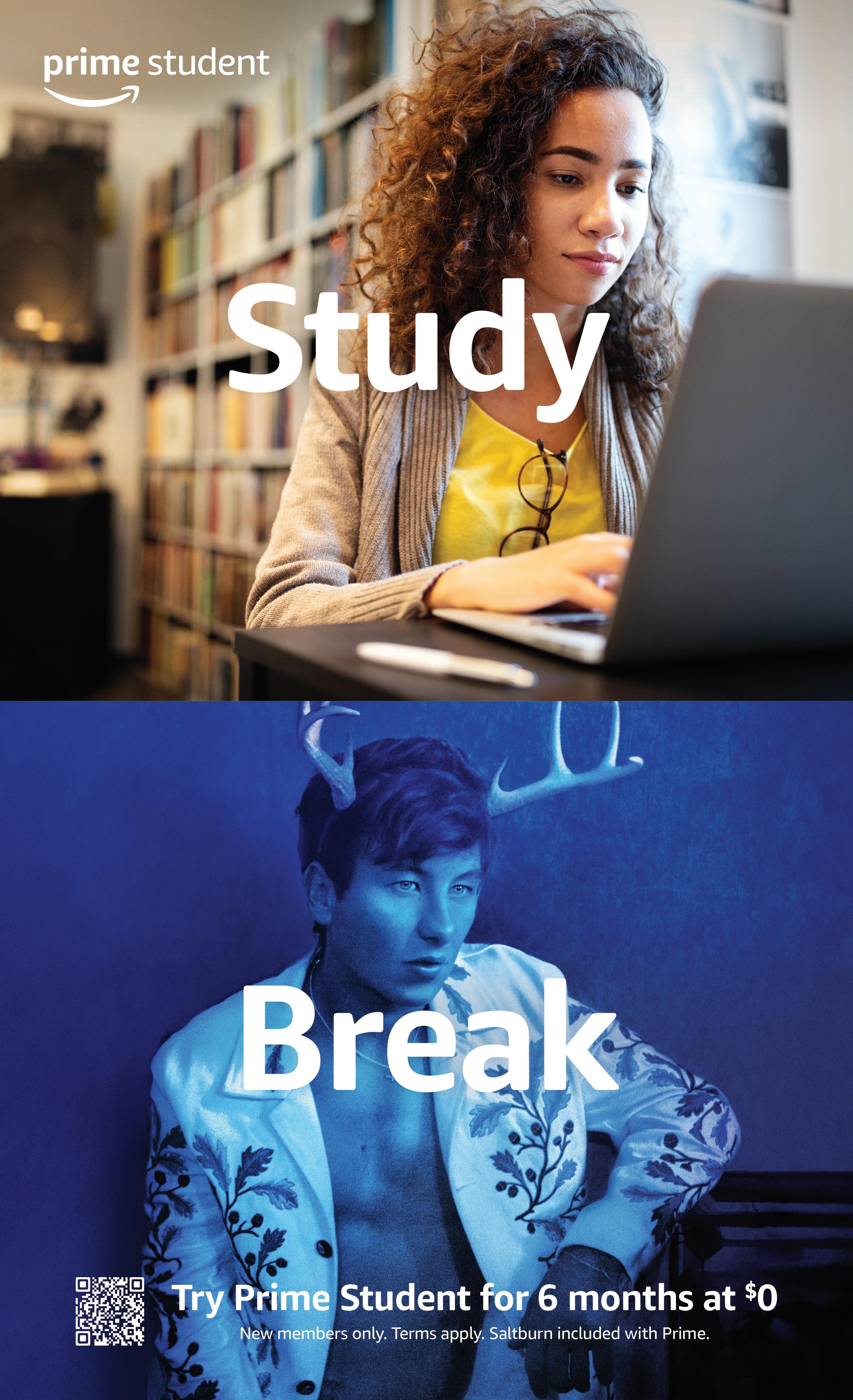

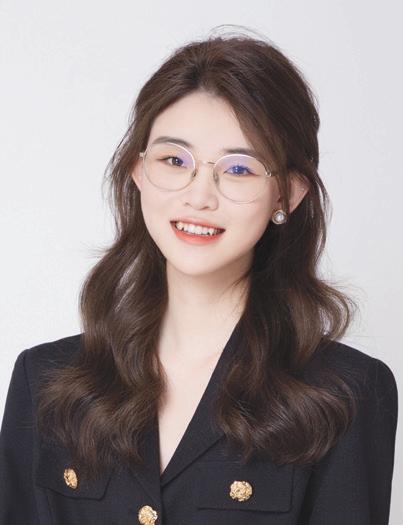

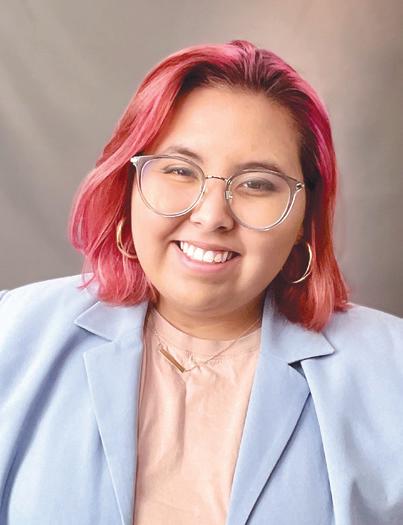


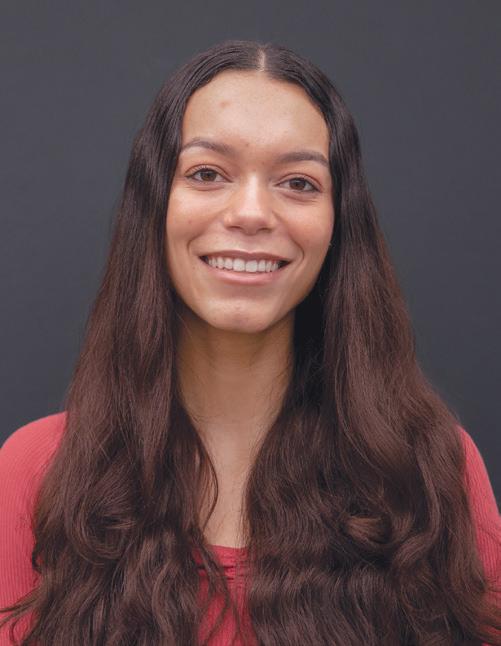
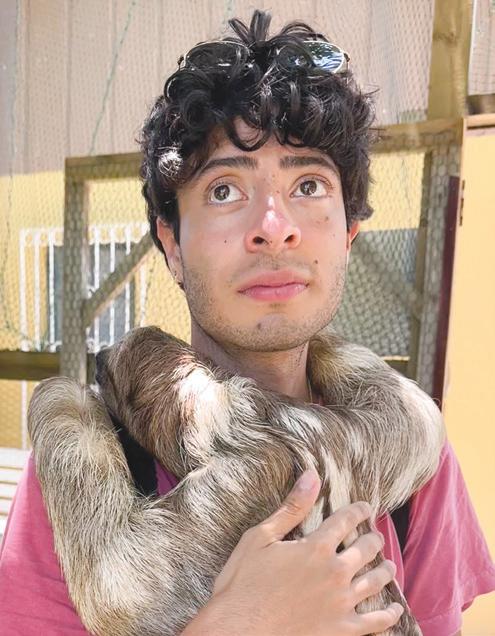
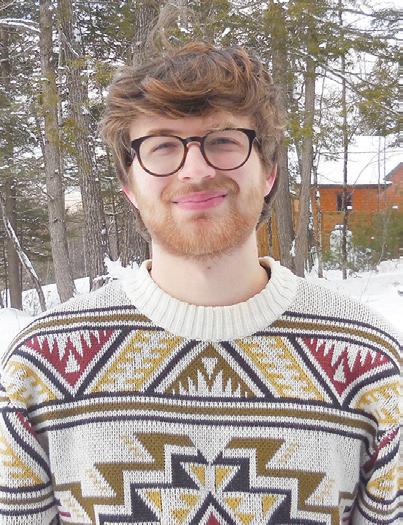
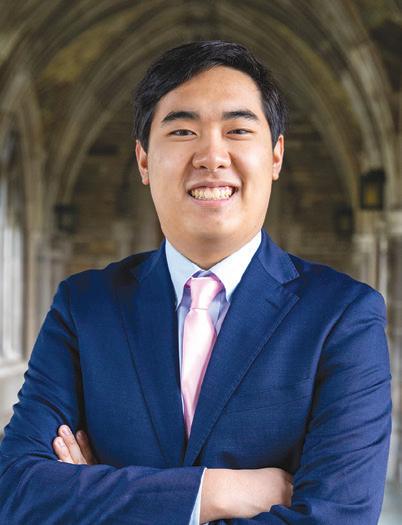
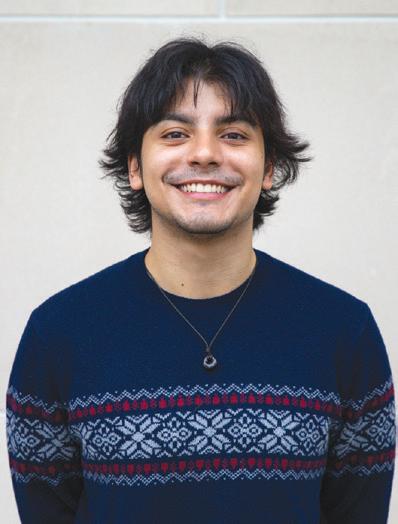

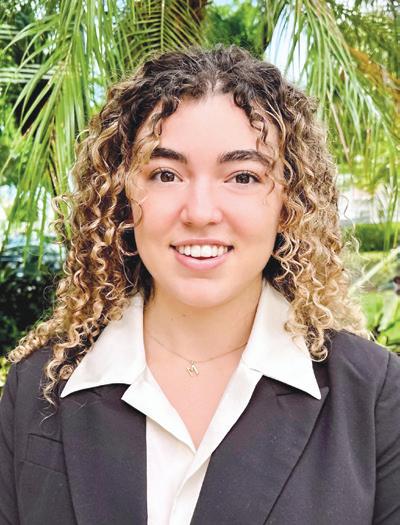


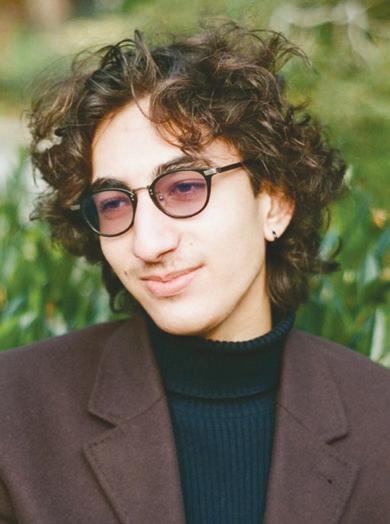
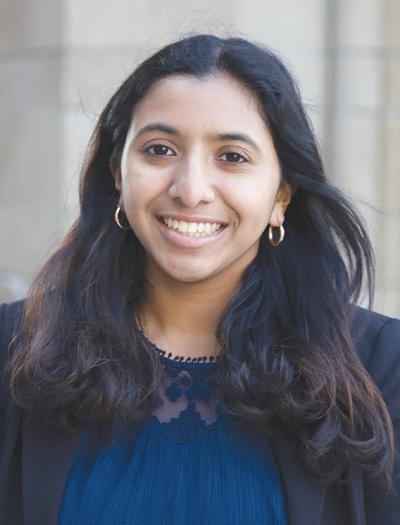
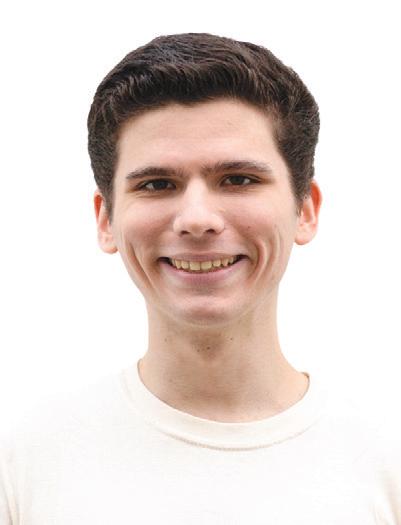
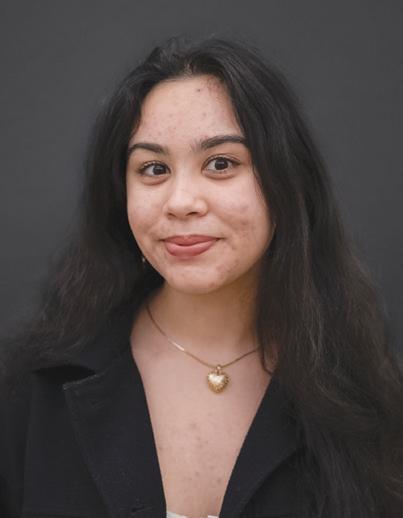

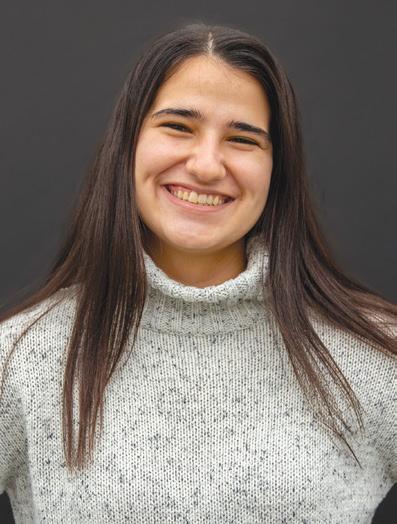
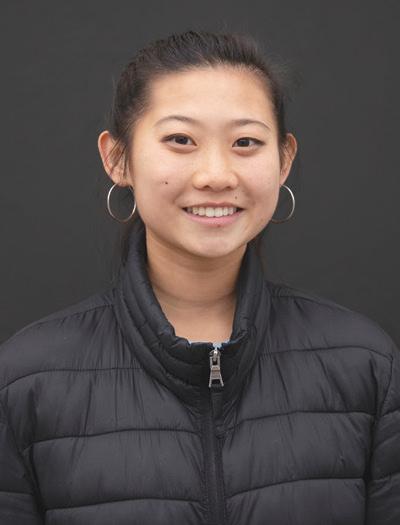


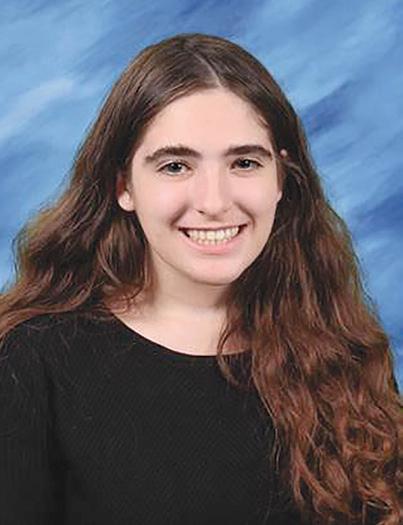

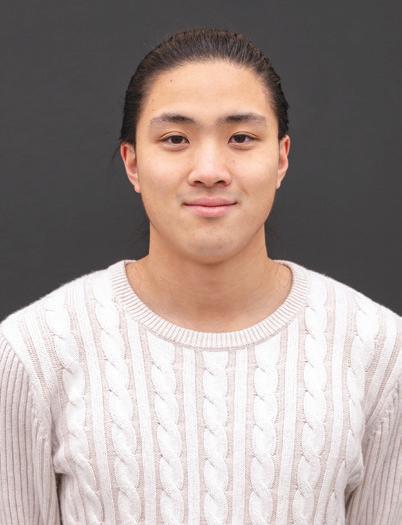
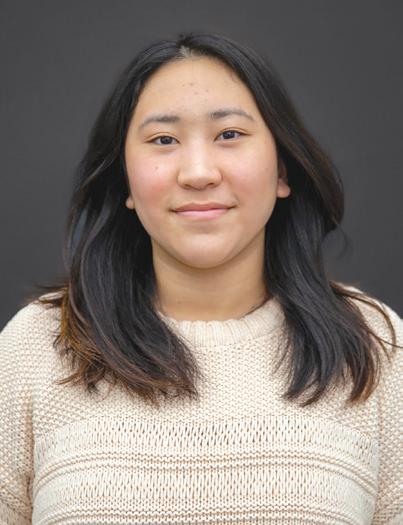
Not Pictured
NIHAR
DAVID
MING
KATE KIM Layout
ELI


 By DANIELA ROJAS Sun Dining Editor
By DANIELA ROJAS Sun Dining Editor
The Alley Cat Cafe is known for its adorable cats (from Browncoat Cat Rescue) and welcoming environment. Some people know the cafe from its feature in the Netflix documentary “Inside the Mind of a Cat.” Alley Cat Cafe is where you go when you need relief from the hustle and bustle of Cornell life. After spending time with the cats, you can order the purrfect drinks, sandwiches and treats to satisfy your taste buds —or perhaps cope with not leaving with one of the cats that has sat on your lap for 20 minutes and began making biscuits on your hoodie. One thing you may not know about this cafe, however, is how deeply it’s connected to its community. According to the owner, Kristin, Alley Cat Cafe works with a diverse list of small businesses specializing in a wide variety of goods.
Madeline’s Bakery
Madeline’s is the bakery behind many of the Cat Cafe’s sweet treats. Madeline’s is a (primarily) wholesale business that’s an “independent, small, minority, women-owned business.” Their cupcakes come in chocolate, mocha, vanilla, lemon and red velvet flavors. Their buttercream icing comes in vanilla, chocolate, mocha, coconut. Madeline’s also offers white or dark chocolate ganache as frosting. As a sweet bonus, all cupcakes come with sprinkles. In addition to cookies, scones and custom layered cakes, Madeline’s also makes specialty cakes and other desserts, some of which can be made vegan and/or gluten free upon request. Alley Cat Cafe does offer some of Madeline’s gluten free and vegan options, ranging from tiramisu, creme brulees, flans, pots de creme and several kinds of chocolate mousse.
Little Tiger Bakery
Little Tiger Bakery also provides Alley Cat Cafe with other pastries including Alley Cat’s famous “meowcarons” (macarons). Little Tiger Bakery is a queer-owned home bakery supplying private and wholesale orders in Ithaca. Little Tiger Bakery’s Instagram page documents numerous masterpieces created for Alley Cat Cafe in addition to macarons: a cat-shaped cake, vegan cardamom cupcakes, scones alongside vegan and gluten free chocolate cake topped with fresh strawberries.
Gil’s Honeybees
Alley Cat Cafe also sells honey that can be purchased byAlley Cat Cafe also sells honey that can be purchased by the jar. Gil’s Honey is a family-owned apiary (a place where beehives are kept) in Ithaca that’s run by three generations of beekeepers. Gil’s produces “raw artisan honey” preserving “the natural pollen, enzymes, and nutrients” using a process free of added chemicals. Gil’s harvests different kinds of honey during spring, summer and early fall. In addition to honey by the jar, Gil’s also sells beeswax products, offering an assortment of beeswax candles and self-care products such as lip balm and skin cream.
Oak & Crow Coffee
Oak & Crow is a small, wholesale coffee roaster based in the Finger Lakes, started “as a way to bring delicious coffees to musicians, articles, cyclists and blue collar workers that keep our communities running at a reasonable price by keeping operations simple.” Oak & Crow also operates a coffee bar in Angelhearts Diner located on East State St in Ithaca (Angelhearts Diner is currently closed for renovations with plans to reopen early 2024, according to their website).
Remembrance Farm
Based in Trumansburg, Remembrance Farm is an 100-acre biodynamic vegetable and dairy farm specializing in “growing salad greens and root vegetables for sale to local stores and restaurants.” Remembrance also provides households with greens through a cooperative Community Supported Agriculture (CSA) program called Full Plate Farm Collective. They also farm dairy, providing organic raw milk, cheese and yogurt to people in Remembrance Dairy CSA.
Lively Run Dairy
Alley Cat Cafe utilizes goat cheese from Lively Run Dairy, “one of the longest operating commercial goat dairies in the country.” Production began at Lively’s family-owned and -operated creamery in the Finger Lakes Region of New York in 1982. Lively Run has a section on their website dedicated to their goats; their herd “consists of French Alpines and Swiss Sannens.” All goats are fed a “wholesome diet of local forage and feed” and they love the attention of guests. People can visit the herd from May through October.
Alley Cat Cafe works hard to be an inclusive space not only for its customers, but also for the businesses they work with. By collaborating with so many small and local businesses, Kristin emphasized how the Alley Cat Cafe provides community for people from all walks of life, in the same way that food can bring people together. “We want to nurture people’s bodies as well as their hearts,” providing a space where both felines and humans alike can bond and knead “biscuits.”
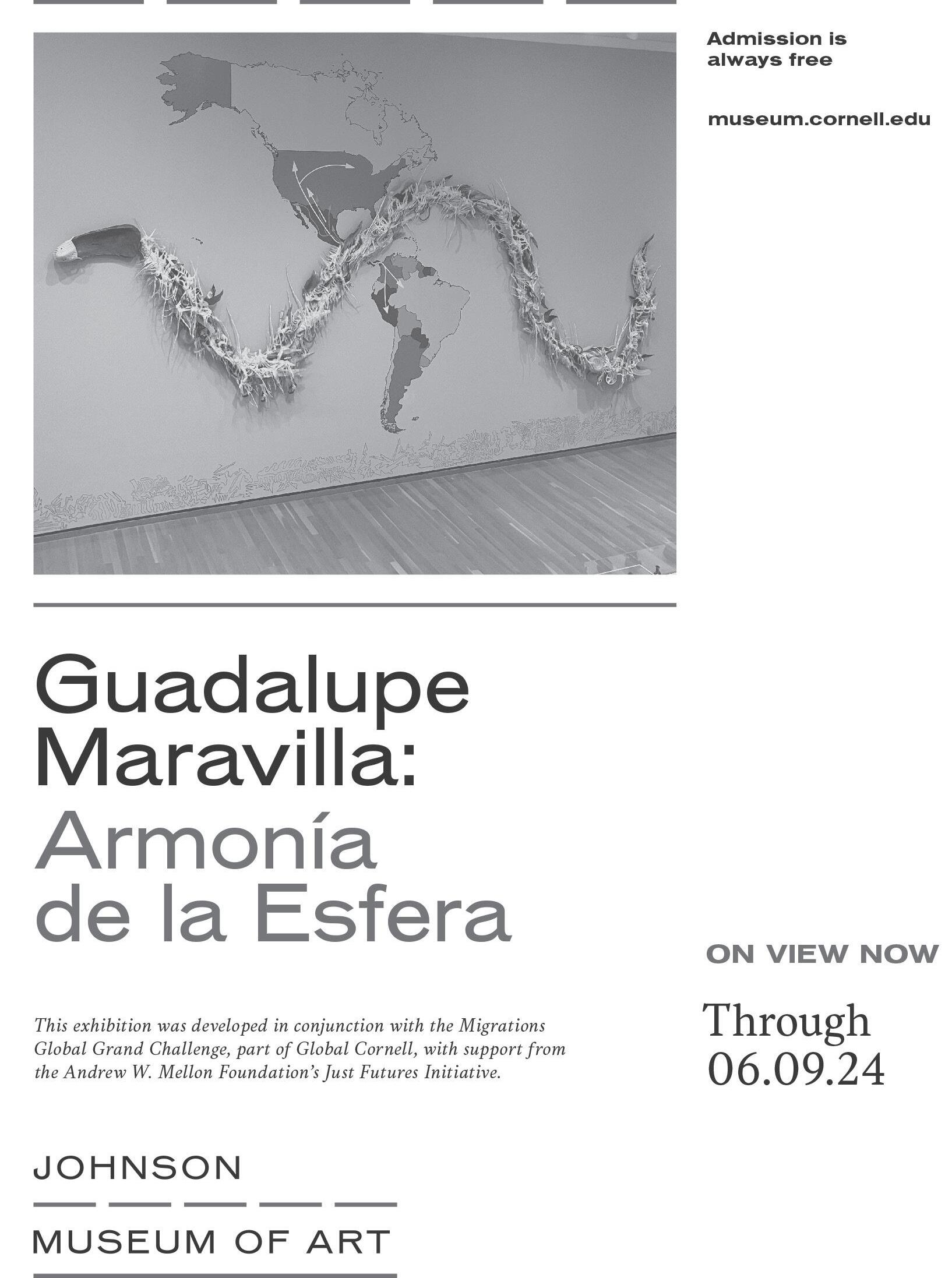
Arden
Grace
Shelia
Courtney
Business Board
Miranda
’27 Vivian Ren ’27
OVER THE PAST FEW WEEKS, our spectacular staff writers have worked tirelessly to uphold our 143-year-old mission of producing independent, fair, student journalism. This paper bids a final goodbye to the 141st editorial board as the 142s prepare to take the helm this weekend, allowing our paper to soar to new heights.
From weathering a tumultuous past year to tackling difficult yet important stories and fighting against the constant battles of running a newspaper in this day and age, The Sun has persisted through it all. While the new guard comes in and our time as editors reaches its sunset, one thing remains true. The Sun’s value as an independent voice on campus is important today more than ever.
As long as The Sun remains an independent publication, we will continue to look to the same goal we have always had: to disseminate truth, inform our community, hold leaders accountable and convey a diverse array of opinions.
While that mission is not an easy one to get right each time, and no one can be perfect on the road to the finish line, there is no doubt in my mind that the paper we leave behind is a reflection of the hard work and passion we have put in.
Each morning as the sun rises over our home on the hill, you can count on The Sun to report on all the issues that matter most to you and encourage you all to use your voices to inspire and uplift. As 142 takes on the mantle, there is no doubt in my mind that they will deliver the same level of dedication and passion to you all, our dear readers.
Jessica
Social Media Board
Dorothy France-Miller 27
Eric Lechpammer 27
Henry Fernandez ’27
Jade Dubuche 27
Madeleine Kapsalis ’26
Sofa Principe ’27
Timmy Xi 26
Marian

Yash Moitra is a first-year student and Student Assembly representative for the Dyson School of Business. He can be reached at ym522@cornell.edu.
Over the past week, I’ve skipped most of my classes, bombed a quiz or two and haven’t been able to prepare for any of my prelims. I’ve been called slurs, told to “watch my back” and even had people I knew refuse to speak with me in public.
I’m Yash Moitra, and I’ve been under constant threat, always scared that the anonymous posts would come true. If you looked my name up as of last Tuesday, it’s one of the first things you’d see: “Who is Yash Moitra?” Well, I’m Yash Moitra, and this is my side of the story.
It was late at night. I got a phone call from a close friend. He asked if I wrote “the manifesto.” I genuinely had no idea what he was talking about. Soon, the posts began to roll in: It began on Sidechat and soon spread to Greekrank. The rumors had no bounds: Some claimed I tried to “expose” business clubs; some said I single-handedly took down the frats; and some just called me an “untouchable.” I tried to ask anyone who might know: Where did this come from? My weekend plans typically involved going to several frat parties, but I never tried to rush. I didn’t even know what the process looked like. To this date, I don’t know why anyone thinks I had anything to do with it. Online forums, however, didn’t seem to care. No one cared that I never sent any reports or manifestos to anyone; no one cared that the IFC President and Advisor both clarified this to every single fraternity leader as of last week, and no one cared that your upvotes on unfounded posts were creating a very real danger for me.
I’ve been quoted in the Sun twice: once saying that antisemitism was bad, and once saying that business clubs could schedule events better. That’s it. I don’t hate the business clubs or fraternities, nor do I have any idea of the allegations that were leveled against them. As it would seem, though,
someone began a rumor that I wrote a “manifesto” of hazing violations and sent it to someone else. I did not know about and have no involvement in the matter, but this doesn’t seem to matter, because, over the past few days, all I’ve heard from anyone who knows me is: “Did you do it?”
So, dear friends, fraternity brothers, classmates and prospective employers: I didn’t do it. Please stop judging me, threatening me and telling me, “I’ll pay for what I did,” because I didn’t do it. There is not a shred of evidence to suggest that I had anything to do with this, so why me? Why me, Cornell? Frankly, I couldn’t name half the fraternities if I tried, and I don’t know many people who are rushing. I didn’t want to stir up a storm when I commented on the business clubs either; my quote was misinterpreted, and I sincerely regret it. Some of my best memories at Cornell so far have come from late nights at a frat house and inspiring coffee chats with club members. I respect and appreciate what these organizations bring to Cornell, and I do not want to harm them in any way, shape or form. Do they need reform? Maybe. Nothing is perfect, after all. But are they still an incredible force for genuine bonding and healthy connection? Yes.
I’m Yash Moitra, and as much as some of you may not want to believe me, I am not the person you’re looking for. I am a freshman who has spent maybe six months in this country, and I am scared for dear life. Because of what those posts did, I can’t ever focus in class; I check to see if I locked my door five times; and I find myself constantly looking over my shoulder to see if someone’s following me.
I’m Yash Moitra, and I genuinely just want to have a good time. Yes, I applied to a lot of business clubs. Yes, I don’t look like you or talk like you. Yes, I probably don’t fit into your version of normal. But all I want is for you to look beyond that.
I’m Yash Moitra, and I want to be a member of the Cornell community. You may not see it, but I sit for hours at the Student Assembly every week making policies to improve your time here. You may not notice it, but I worked two jobs last semester just to sustain myself. You may not
know it, but I spent weeks refining my resume for business club applications, only to be cut because of one single quote that was misinterpreted.
Alas, it may not matter to you. For many of you, scrolling past is easy. Ignoring it is easy. Not looking at it is easy. For me, though, it’s really not. I may not ever know why people thought that I “took the frats down,” and I don’t particularly expect anyone to care.
To continue reading, visit www.cornellsun.com.

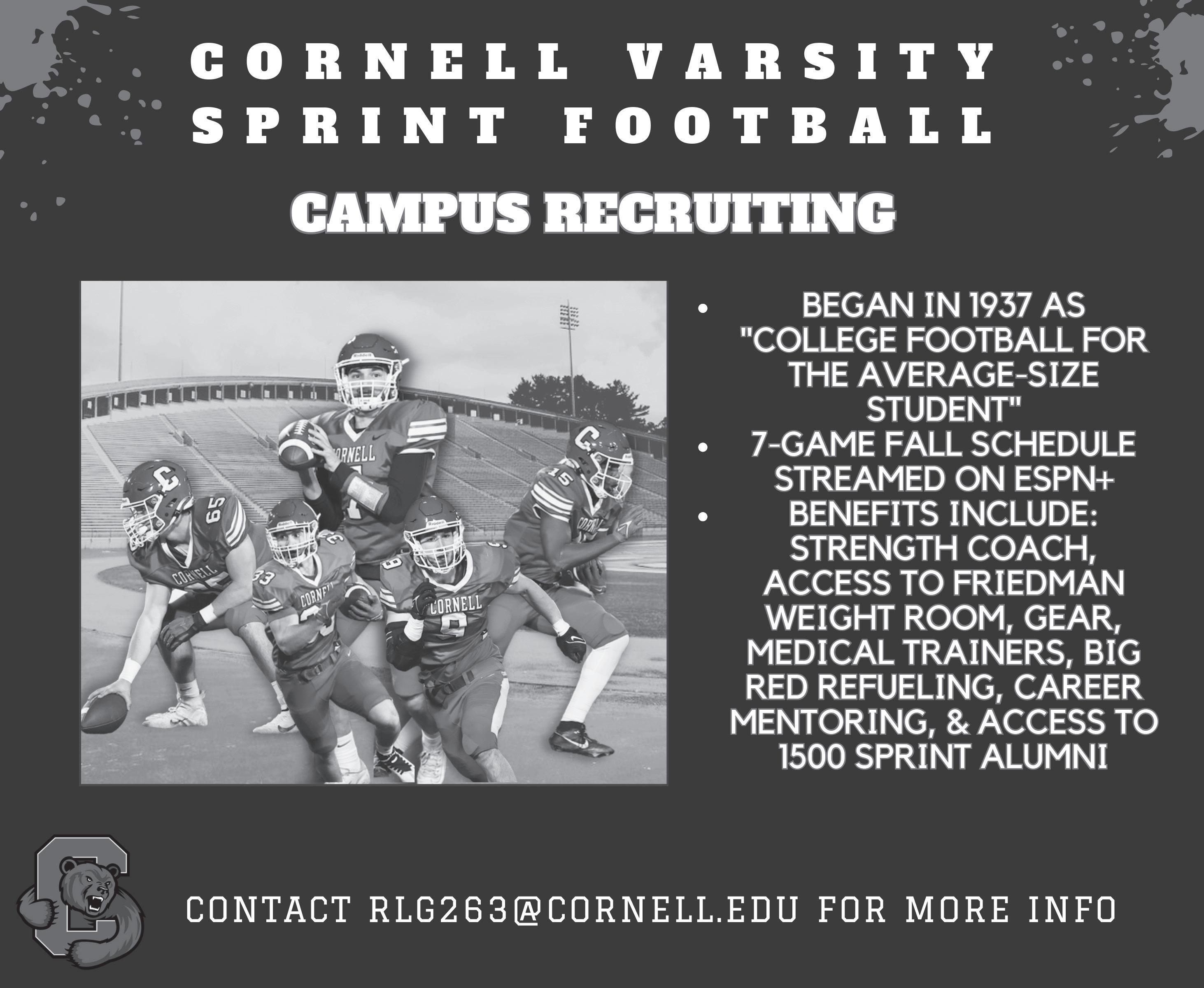



An interdisciplinary team of Cornell researchers developed a nanofiber-coated cotton bandage that utilizes the antibiotic and environmentally sustainable properties of Lawsone, a ring-shaped compound found in henna leaves.
Traditional cotton gauze bandages act as a physical barrier for wounds, helping fight infection. However, cotton lacks the properties necessary to actively promote healing. A bandage that can both fight infection and enhance healing must have bioactive agents — compounds that directly influence the biological function of cells and can therefore be used in biomedical applications.
Many cotton-based bandages on the market add cost-efficient synthetic materials such as polyester to enhance wound healing. According to Mohsen Alishahi grad, synthetic materials also have consistent molecular rates and that make them easier to process for wound dressings when compared to their natural counterparts.
However, the push for the development of sustainable technology amid growing concerns on climate change and biodiversity loss inspired the team to create a fully biodegradable bandage that maintains the healing properties of synthetic models.
Three natural agents — Curcumin, Lawsone and Quercetin — were initially explored as candidates for the project by the team of researchers in the fiber science department and College of Veterinary Medicine, led by Prof. Tamer Uyar, human centered design.
Curcumin, the active chemical that gives turmeric its potent yellow color, was proposed because of its anti-inflammatory properties. Quercetin, a pigment in plants, was identified for its antioxidant properties — the ability
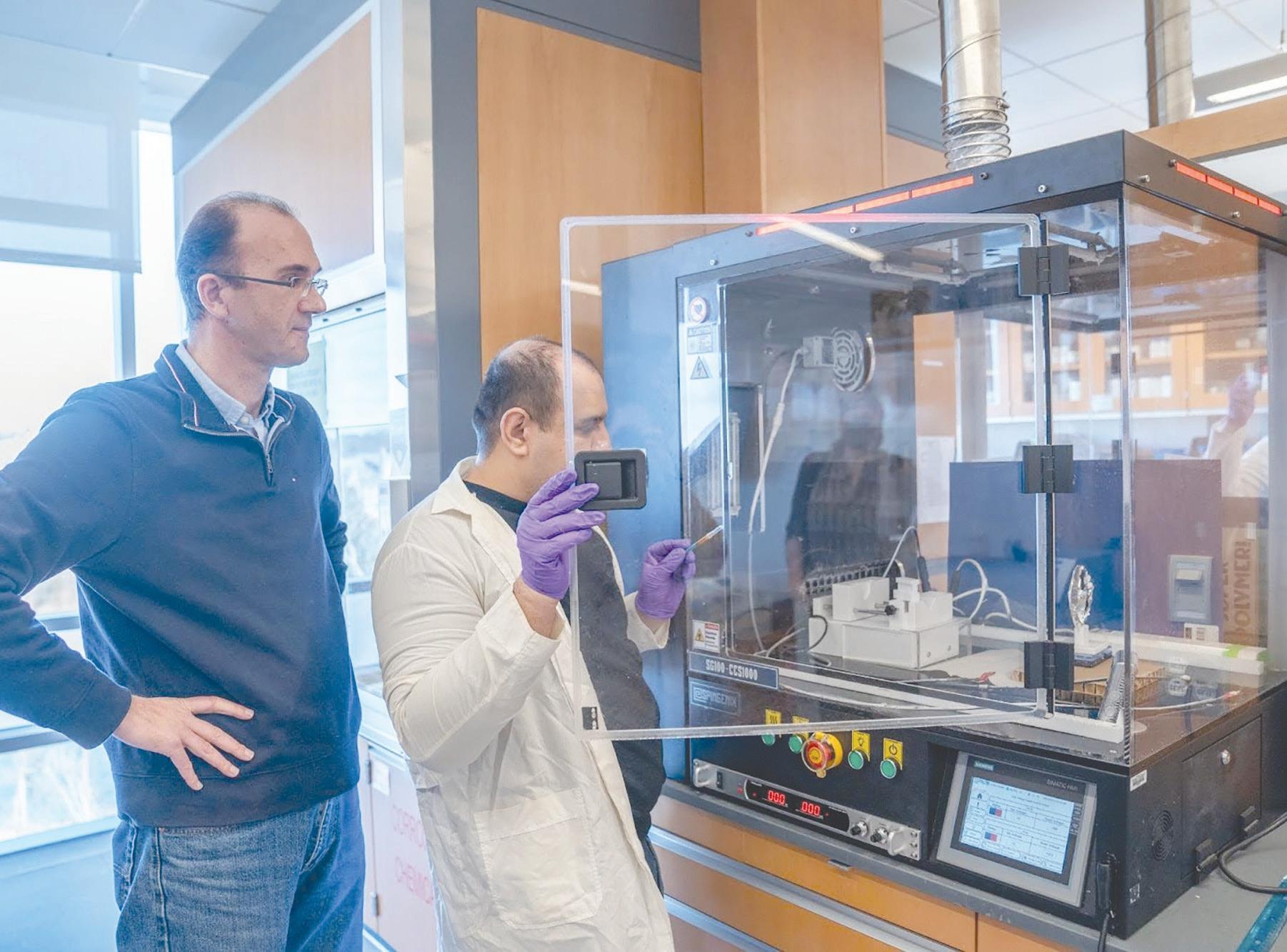
to address the damages caused by unwanted particles in the body. Lawsone, an extract of the henna leaf often used in hair and skin dye, was proposed for its anti-inflammatory and anti-bacterial properties.
Ultimately, Lawsone was selected for the project due to its superior ability to resist bacterial infection, according to Uyar.
However, Lawsone is not without its limitations. Its low solubility prevents it from being readily absorbed by the body, presenting an experimental challenge. To combat this low solubility while still using sustainable materials, the team used cyclodextrin, a large molecule that binds Lawsone.
“Cyclodextrin is a sugar-like material that comes from starch. It’s also non-toxic and comes from nature,” Uyar said. “All the ingredients that we have used are biodegradable, and that’s why there is no burden on the envi-
ronment when they are thrown away.”
The team then worked to fabricate the ultra-thin fibers using the electrospinning method, a common practice in fiber science where a high-speed jet formulates woven material. The nanofibers were then used to coat a cotton base. Once the fiber scientists completed the process, they referred their findings to biomedical experts with the necessary materials and expertise in the field of microbial testing. Their role was to test the antibacterial performance of the dressing against known bacterial species.
In collaboration with Prof. Craig Altier, population medicine and diagnostic science, and Senior Research Associate Rimi Chowdhury from the College of Veterinary Medicine, the fiber science team assessed the antibacterial properties of the dressing before adjusting their design in what Alishahi
described as a long period of trial and error.
“If we see that we don’t have suitable antibacterial activity, we might have to modify our system to increase the solubility or concentration of Lawsone,” Alishahi said.
The Lawsone dressing was shown to be a strong protective agent against harmful bacteria. This property is critical, especially amid growing concerns in the medical field over the surge in antimicrobial resistance.
When an antibiotic is used in excess, bacteria may develop resistance over several decades, creating a “superbug” that can overcome the antibiotic and render it ineffective. Although combating antimicrobial resistance is not the primary goal of the research, the Lawsonecoated bandage may slow this process down because of its use of natural materials.
“By using natural materials, you don’t really create these superbugs,” Uyar said. “That means we are using less sensitive antibacterials, which means there will be less of a problem in the future.”
The Lawsone-coated bandages are to be tested by outside sources before being finalized as a product. The fiber scientists will collaborate with research and development teams to confirm its efficacy before putting it on the market.
As for future developments, the team seeks to expand upon their research by using alternative materials like Curcumin and Quercetin.
Alishahi described the project as a rewarding experience. Despite facing many obstacles and long hours throughout a grueling process, he said it was well worth the challenge.
“When you do multidisciplinary research, you have this kind of connection with everybody,” Alishahi said. “Knowing all of these amazing people, I think that’s the most rewarding part.”
Marissa Gaut can be reached at mlg323@cornell.edu.
New research suggests that the commonly used ‘lab mouse’ may display behaviors entirely distinct from their wild-derived counterparts, prompting new considerations for the future of animal-based research.
Mice are the most commonly used specimen in mammalian research because of their high reproduction rate, ease of maintenance and handling and ancestral similarities with humans. Inbred mice are ideal research subjects for many scientific disciplines because they are essentially genetically identical, which enables better stability and reproducibility in results
The most commonly used inbred strain of mice — C57BL/6J — inspired this study. After observing that C57 lab mice acted in a much more docile manner than their wild-derived counterparts, Caleb Vogt grad, a researcher in the Cornell Laboratory for Animal Social Evolution and Recognition, sought to investigate this difference.
Vogt set up his study using a garden design, placing wild-derived and C57 mice in large outdoor enclosures. He was the first to examine the social and behavioral patterns of C57 mice in these pseudo-natural environments.
These garden environments were created in contrast to the mice’s typical lab environment, which Principal Investigator Prof. Micheal Sheehan,
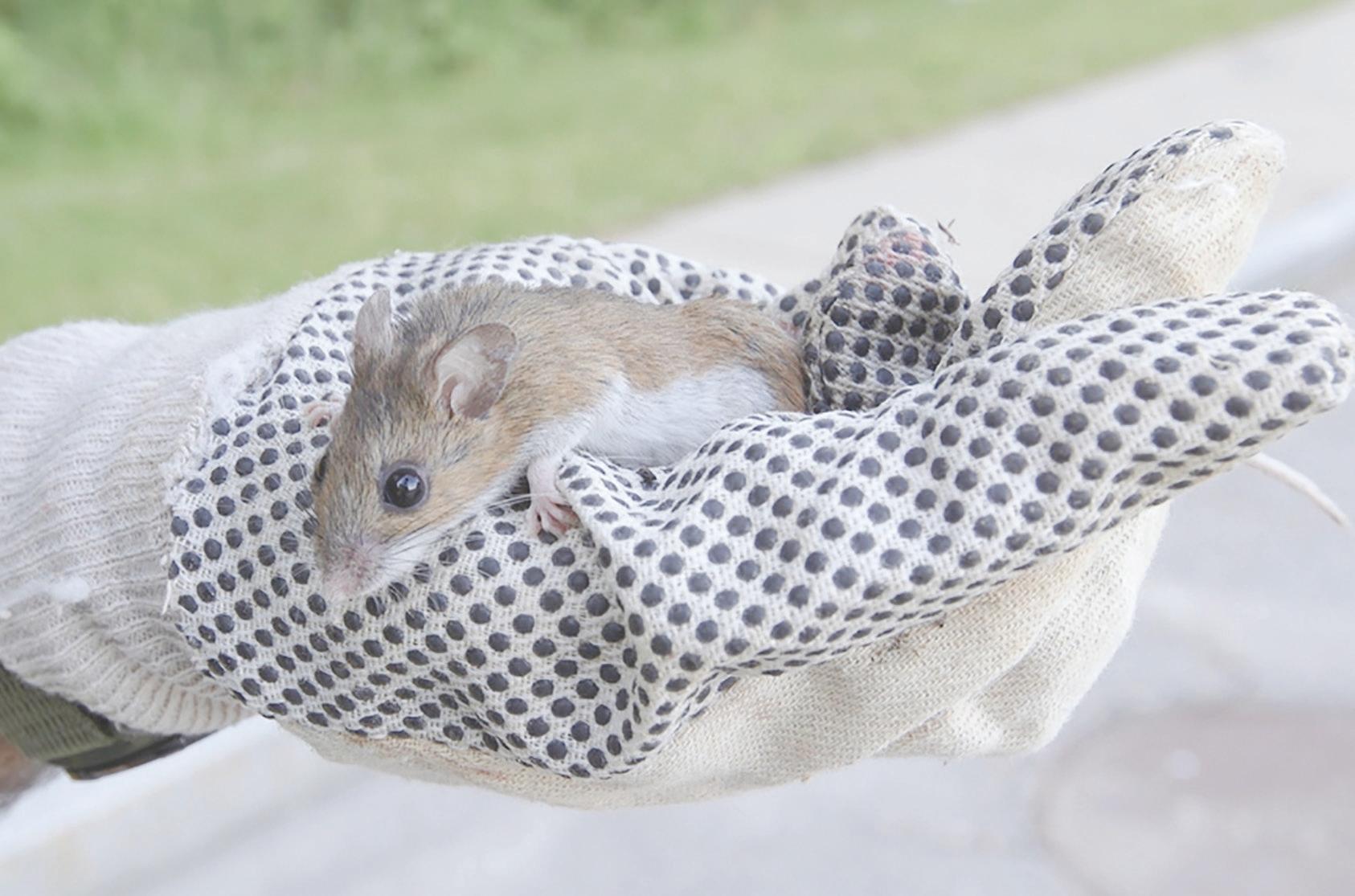
neurobiology and behavior, characterized as “a very socially cramped space.”
Neither Sheehan nor Vogt anticipated what they would find out about mice behavioral patterns when female C57 mice were placed in a more open environment.
“The male results were not very surprising,” Vogt said. “We were not expecting what we found in females.”
The female C57 mice demonstrated distinct social behavior from their wild-derived counterparts, with more interconnected social structures and less bias towards familiar social partners.
The C57 females spent only 18
percent of their time alone, as opposed to the 83 percent that wild-derived females spent alone, and more readily explored their enclosure. Additionally, the C57 females did not show preferential interactions with their sister mice and interacted freely with all of the other females.
The male C57 mice demonstrated similar but muted territorial behaviors to their wild-derived counterparts. When they were first placed into the enclosures, both the C57 and wild-derived mice shared space with their cage mates. Over time, the territorial overlap decreased as they began to establish
their own spaces.
It took an average of 54 minutes for the territorial overlap to collapse in wild-derived mice, compared to 590 minutes in C57 mice. The reduced urgency of establishing clear spatial boundaries highlights the dampened sense of territoriality in lab mice compared to wild-derived mice.
The results of this study have implications extending beyond mouse behavior — they will add “context to the way we interpret the biomedical model,” Vogt said.
“All of our biology is influenced by our environment, and the lab is but one environment,” Sheehan said.
According to Sheehan, an animal’s biology cannot be separated from their behavioral tendencies and preferences, which are likewise influenced by their environment. This raises the question of how manipulating environmental factors can affect health and fitness outcomes for individuals. Sheehan is particularly excited by the prospect of “marrying sociobiology and socioecology with tools available in biomedical mouse models” moving forward.
There is “a lot of work to be done using this approach,” said Vogt, who hopes that this integrated approach “can supercharge the way that we study social relationships [in the animal world].”
Maggie Walsh can be reached at mmw234@ cornell.edu.